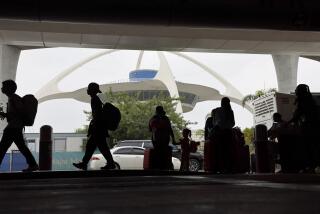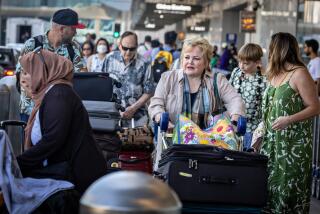New technology may reduce TSA pat-down searches in U.S. airports
- Share via
The federal government says it has plans to use advanced technology to dramatically reduce the number of pat-down searches performed at the nation’s airports.
The Department of Homeland Security recently put out a request for technology companies to come up with a hand-held scanning device that can be used instead of pat-down searches on passengers who set off alarms on full-body scanners.
The department oversees the Transportation Security Administration, which operates about 700 full-body scanners at 180 airports across the country. When the scanners detect a hidden object, TSA workers perform a pat-down search.
But critics say TSA screeners rely on the pat-down search too often. Even former Secretary of State Henry Kissinger got a full-body pat-down at LaGuardia Airport in New York recently.
In a government document, the Department of Homeland Security said it seeks a hand-held device that weighs less than 5 pounds and can determine whether a hidden object on a passenger is a weapon or explosive. The device should produce a result in less than 15 seconds, the TSA request said.
“If possible, the goal is to detect all threats including metal and explosives,” according to the request.
Plan approval and testing could take at least a year. The request did not say how soon the device might show up at airports.
“TSA is continually seeking ways to enhance the safety and security of travelers in ways that will minimize inconveniences,” TSA spokesman Nico Melendez said.
China to surpass U.S. in business travel spending study says
Americans have long held the title of the world’s biggest spenders when it comes to business travel. But China is expected to overtake the U.S. by 2015.
That’s one of the findings of a study by the Global Business Travel Assn., a trade group for the world’s business travel managers.
U.S. businesses spent an estimated $250 billion on business travel in 2011, and Chinese businesses spent $182 billion, according to the study.
But the study predicts Chinese business travel spending will surge 11% in 2012 to $202 billion and 21% in 2013 to $245 billion. The spending growth rate will be fast enough for China to surpass the U.S. in the next three years, the study said.
China has set the table for the growth. Over the last 10 years the country’s four largest airports have doubled in size, and the government has plans to build nearly 100 airports in the next 10 years, according to the study.
“We forecast significant increases in business travel by Chinese citizens over the next two years, with at least two-thirds of the growth being real increases in trips and spending, as opposed to rising travel prices,” said Michael McCormick, executive director of the business travel group.
Families flying coach won’t get preferred United boarding
Families flying coach on United Airlines who don’t have “elite” flier status may need to pack an extra dose of patience. United has dropped the policy of letting these families be seated ahead of general boarding passengers.
The move was intended to eliminate confusion and simplify the boarding process, said Rahsaan Johnson, a spokesman for United Continental Holdings.
In coach, families without elite flier status used to board just after disabled passengers, active members of the military and elite status fliers.
That changed this month.
“This just simplifies the process,” Johnson said.
Families that fly first- or business-class can still board early.
Other airlines have made similar moves. For example, Southwest Airlines used to give families boarding priority but ditched that policy in 2007.
More to Read
Sign up for The Wild
We’ll help you find the best places to hike, bike and run, as well as the perfect silent spots for meditation and yoga.
You may occasionally receive promotional content from the Los Angeles Times.






